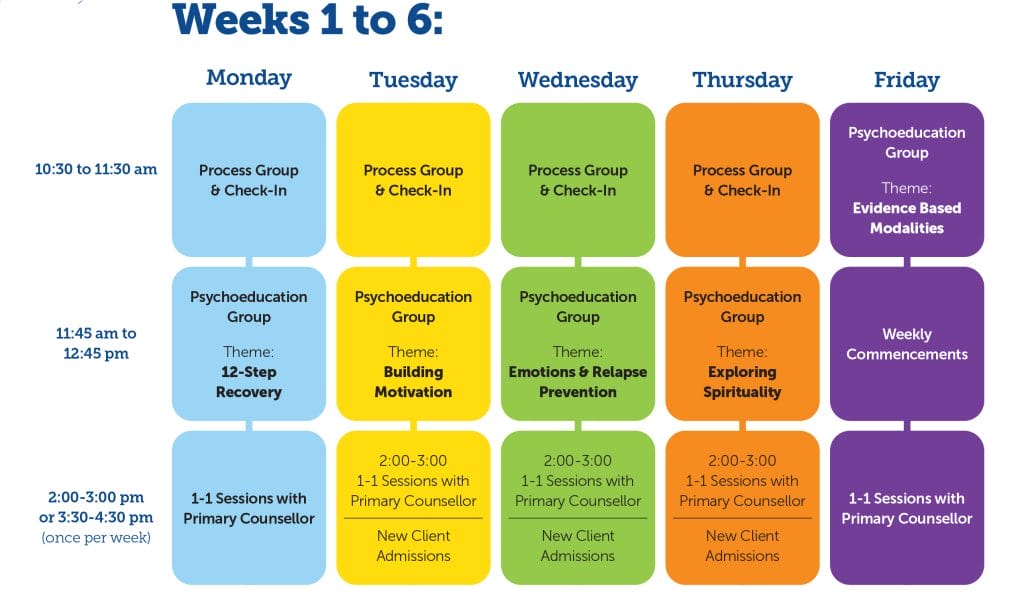Renascent provides an abstinence-based Virtual Intensive Treatment Program (VITP) as part of its continuum of care to help ensure clients can enter substance abuse treatment at a level appropriate to their needs.
This is an intensive program that involves a meaningful commitment of time, energy and focus. Groups are 60 minutes long, twice/day from Monday-Friday. To complete the program, attendance of 80% is required.
- This program works best when you have a strong support system in family or friends and currently live in structured, supportive housing.
- A private and quiet space, stable internet connection, and working camera are basic requirements necessary to allow for easy and engaging participation.
- Attendance in group with camera on is a group norm and expectation. Facilitators may encourage equal participation in meetings; please know you maintain choice and control over what, when, and if you choose to share.
- Sobriety is a requirement of participation in each day’s group sessions. You can expect our staff to maintain a safe, inclusive, and controlled group experience.
- This is an abstinent-based program which also supports harm reduction goals. Anyone working towards a goal of change with substance use is welcomed and will be supported.

Core Elements of Program
- Daily Process Group Therapy (10:30-11:30am): Involves a gathering of peers who are also in recovery and a clinician to help guide the sessions. Group sessions are a safe, non-judgemental space where group participants feel comfortable sharing about gains and losses in the recovery process.
- Daily Psychoeducational Group Therapy (11:45am-12:45pm): You’ll learn about addiction and mental health issues. Topics center around subjects like: Stages of Change, Post-Acute Withdrawal Symptoms (PAWS), Emotional Regulation, Values, Boundaries & Assertive Communication. A range of therapy modalities are utilized, including: Twelve-Step Facilitation (TSF), Mindfulness, CBT, DBT, Relapse Prevention, and Motivational therapies.
- Weekly Individual Counseling Session (2:00-3:00pm or 3:30-4:30pm):
To help get the most out of these sessions, approach the therapy as a collaborative effort, be open and honest, and follow through on self-determined next steps and actions. There will be opportunities to better self-understanding, enhance motivation for change, develop new coping skills, create goals, challenge unhelpful thinking, create an individual treatment plan and relapse prevention plan.
Virtual Intensive Treatment Program Schedule

- Supplemental Group Sessions
- Specialized medical lectures delivered by Renascent’s Medical Directors.
- Family Program sessions delivered by Renascent’s Family Counselling Team on Tuesdays from 7:00 – 8:00 PM.
- Introduction to Continuing Care
- Alumni Care Program Meetings on Wednesdays from 7:00 – 8:00 PM.
Read Less…
Recommendations from the Clinical Team
- Acknowledge the strength you have displayed simply in showing up for yourself and exploring therapy. You have already taken a step toward making different choices.
- Recovery can be a catalyst for finding one’s meaning and purpose in life.
- Mutual help meetings and group therapy offer the chance to be honest and this can be an opening to begin healing. Vulnerability and honesty feel good.
- Being part of an engaging community gives us a sense of belonging and can make us feel as though we are a part of something greater than ourselves.
- Many in early recovery are plagued by immense feelings of guilt and shame. Recovery offers the chance to take actions that rebuild a sense of self-worth and self-esteem by doing the next right thing.
- Develop an optimistic and curious approach to spirituality. Becoming more spiritual can be as simple as staying silent for 5-10 minutes and checking in with yourself. It can be a commitment to yourself to find moments of transcendent emotions each day: hope, kindness, self-compassion, gratitude, wonder. A spiritual awakening is simply a different perspective and a new outlook on life.
- Learn to appreciate the joy that is already present in every moment. Find a path to building a mindfulness or gratitude practice. Learning how to live in the now more often can help us have a quieter mind and more open heart.
- Healthy relationships do exist and connection is a fundamental component of our psychological wellbeing. Learning how to create healthy boundaries makes our expectations clear so others know how we want to be treated.
- Learning to be of service to others is transformational. When you serve you are thinking about others and not yourself. Attending group and sharing of yourself is an act of service. When you help others, it’s hard to be lonely.
- Figure out what self-love looks like for you, it’s an important part of mental health and your recovery. To practice self-love, start by being kind, patient, gentle and compassionate to yourself, the way you would treat a friend.
If you have any questions or concerns, please call us prior to your admission at:
1-866-232-1212 and ask for the Client Care and Access Centre.

